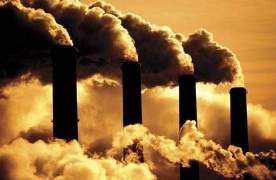|
Carbon Markets Are NOT Cooling the Planet
by Stephen Leahy via pip - IPS Thursday, Jun 23 2011, 11:16am
international /
environment /
other press
Carbon markets have been widely promoted as the only way to generate enough money to enable industries and countries to reduce their carbon dioxide emissions, which are largely responsible for global warming. The only problem is that nearly 20 years after their conception, they have failed to work, and have also been subject to fraud and other financial crimes.

Interpol, the world's leading policing agency, has warned that carbon market schemes are easily taken advantage of by organised crime.
Earlier this year, carbon credits worth 38 million dollars went missing in the European Union's carbon market after funds were transferred by computer hackers from the Czech Republic to Poland, Estonia and Liechtenstein before disappearing. That was the fourth time funds had been stolen or mislaid.
"A lawyer formerly involved in carbon trading told me that if markets are still trading carbon 10 or 15 years from now, then the global environment will be in very big trouble," Steve Suppan, senior policy analyst at the U.S.-based Institute for Agriculture and Trade Policy (IATP), told Tierramerica.
"Carbon markets are open to fraud, misrepresentation and deceptive promotion," Suppan said in an interview at the United Nations Framework Convention on Climate Change (UNFCCC) negotiating sessions held in Bonn Jun. 6-17.
These markets have had huge support from governments and they still do not work to effectively reduce greenhouse gas emissions, said Suppan, whose organisation works on trade, agriculture and environmental issues.
Climate change is the result of emissions of global warming gases, mainly carbon dioxide from the burning of fossil fuels.
The two main ways to address the problem - known as mitigation - are to reduce those carbon emissions at source or to capture and store ("sequester") carbon in plants, trees and soils. The latter means reducing deforestation, increasing reforestation, and utilising sustainable agriculture and grazing practices to either keep carbon stored or encourage its capture.
Markets are widely believed to be the only way to mobilise enough private capital to reduce emissions, but this is simply not true, says Jutta Kill of SinksWatch, a UK-based NGO that tracks and scrutinises carbon sequestration projects.
"There is an assumption we can't get the necessary money for mitigation any other way," Kill said at an event here. "And there is another assumption that money is the answer."
In the early 1990s, when the Kyoto Protocol was being debated at UNFCCC negotiations, no one wanted markets as part of a climate agreement except the United States, says Payal Parekh, a Swiss-based climate scientist and energy expert.
Finally, however, Europe and other countries "did a deal with the devil" and the Protocol, which obligated industrialised nations to reduce their emissions by five percent between 2008 and 2012, was signed in 1997, Parekh told Tierramérica.
The United States subsequently refused to ratify the Protocol and backed out of the entire agreement. However, their market component remained.
That legacy has resulted in carbon offset markets which allow rich countries in the North to invest in "emissions-saving projects" in the South while they continue to emit carbon.
The biggest of these offset markets is the UN's Clean Development Mechanism (CDM), with almost 3,200 registered projects so far in Africa, the Asia-Pacific region, eastern Europe and Latin America and the Caribbean.
The CDM has been widely criticised because in order to actually reduce emissions, the money the North invests has to be in emission-reduction projects that would not have happened without that investment.
That requires expert, independent verification and a "crystal ball" to know whether or not a wind farm in China would have eventually been built with or without CDM money, said Parekh.
"The evidence is clear that it hasn't worked," she said, citing various studies that estimate that 20 to 90 percent of CDM projects do not result in lower emissions overall.
"Industrialised nations could have met their Kyoto obligations without markets," she added.
The world's biggest carbon market is the EU Emissions Trading System (EU ETS), which accounted for 95 percent of the 144 billion dollars in carbon transactions in 2010.
Not only has it been subject to fraud, with more than 100 people in several countries charged last year, but it also does not put much money into emission-cutting projects.
"Only a small fraction" of the money "actually makes it into the ground," said Kill.
The EU ETS was set up wrong and has had numerous problems, including speculation and fraud, agreed Parekh and Suppan. "Studies show it really wasn't the main driver of Europe's emission reductions," said Suppan.
"There are a number of other alternatives to markets, such as a financial transaction tax," said Parekh.
A coalition of labour, development and environmental groups called on negotiators here in Bonn to seriously consider pushing for a small tax of less than one cent on financial transactions.
Not only would this generate an estimated 200 to 600 billion dollars a year, it would also discourage market speculators, said Bob Baugh, representing the U.S. labour organisation AFL-CIO.
"Everyone talks about the need for a Green Climate Fund (to help developing countries cope with climate change), but no one wants to talk about how to pay for it," said Baugh in a press conference.
France and Germany and even the International Monetary Fund also think the financial transaction tax is a good idea, he said. "It is time for the financial industry to do the right thing," he added.
*This story was originally published by Latin American newspapers that are part of the Tierramérica network. Tierramérica is a specialised news service produced by IPS with the backing of the United Nations Development Programme, United Nations Environment Programme and the World Bank.
© 2011 IPS-Inter Press Service
http://ipsnews.net/news.asp?idnews=56192
<< back to stories
|